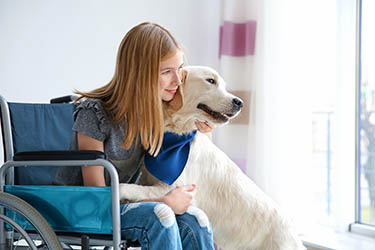Canine Companions for Independence

Service and support animals significantly improve quality of life for many people
Recently in the news there have been numerous reports of people attempting to board aircraft with a variety of unusual animals including a peacock, a chicken, a tortoise and a kangaroo. Claims that the animals serve as Emotional Support Animals (ESAs) present a quandary when defining which animals legitimately provide support versus those that are fraudulently represented as ESAs so their owners can fly with their pets for free.
The American Veterinary Medical Association recognizes the importance of service, emotional support and therapy animals, and provides the legal context for assistance animal use. For example, federal regulations regarding assistance animals is defined by the U.S. Department of Housing and Urban Development (FHEO-2013-01), while Emotional Support Animals (ESAs) are regulated under the Fair Housing Act (42 U.S.C. Part 3604) and Air Carrier Access Act (ACAA) and C.F.R. Part 382.117.
The AVMA further outlines animal-assisted interventions that encompass a wide variety of human-animal interactions including animal-assisted therapy, animal-assisted education, animal-assisted activities and resident animals.
Americans with Disabilities Act formally defines “service animal”
According to Title II and Title III of the Americans with Disabilities Act (ADA), a service animal means any dog that is individually trained to do work or perform tasks for the benefit of an individual with a disability including a physical, sensory, psychiatric, intellectual, or other mental disability. Miniature horses also have been added as a specific provision to the ADA.
While April 25 is International Guide Dog Day, there are several types of service dogs including allergy alert, autism assistance, medical alert, hearing, psychiatric service, seizure response, assistance for people with physical disabilities and many others. In order to be a service dog, the canine must complete specialized training that allows them to perform specific tasks. There are several organizations around the country that train dogs of different breeds to perform a variety of specific tasks.
Canine Companions for Independence
Canine Companions for Independence is a nonprofit organization that breeds, raises and trains Labrador Retrievers, Golden Retrievers and crosses of the two breeds to serve as assistance dogs. Canine Companions puppies are born and raised in the homes of volunteers. Headquartered in Santa Rosa, California, Canine Companions maintains volunteer chapters and professional training centers across the United States.
Canine Companions trains several types of assistance dogs including service dogs, hearing dogs, facility dogs, skilled companions and recently started a pilot program to train dogs to assist veterans with PTSD. At eight weeks of age, puppies are placed with volunteers who raise them in their homes for the next 14-18 months and provide lots of care, love, socialization and basic obedience training. Volunteer puppy raisers play integral roles in the development of assistance dogs. Once dogs are fully grown, the puppies return to Canine Companions for professional training to learn advanced commands and tasks. Depending on their strengths and personalities, dogs that graduate may serve in one of the following placement categories:
Canine Companions service dogs partner with people with physical disabilities to assist with daily tasks, provide social support and increase independence. Participants learn how to effectively handle an assistance dog to maximize the use of 40 commands.
Canine Companions hearing dogs are trained to recognize sounds and alert human partners through physical contact.
Canine Companions facility dogs partner with a facilitator who works in a healthcare, visitation or educational setting and are able to perform more than 40 commands designed to motivate and inspire individuals with special needs.
Skilled companions work with adults or children with disabilities under the guidance of a caregiver or parent facilitator who handles and cares for the dog.
How can someone apply for an assistance dog?
Prior to application, anyone interested in requesting an assistance dog from Canine Companions must complete several steps, including reviewing information on the Canine Companions website. The next step is to request an application. Applicants complete a multi-step interview process prior to acceptance, which includes a phone screening, medical paperwork and in-person interview. Accepted applicants are then placed on the wait list until invited to attend a two-week team training class. Training time for the dog varies based on the type of dog and tasks it must perform.
Check out frequently asked questions about Canine Companions for Independence.
Read about Canine Companions’ Veterans Initiative.
Additional resources
To learn more about assistance animals, refer to the newly released AVMA report: Assistance Animals: Rights of Access and the Problem of Fraud.
Contact your Covetrus representative for more information at 855.724.3461.
Sources:
https://www.avma.org/KB/Policies/Pages/Animal-Assisted-Interventions-Definitions.aspx
https://www.ada.gov/service_animals_2010.htm
https://adata.org/publication/service-animals-booklet
https://www.anythingpawsable.com/national-service-dog-month-10-facts-service-dogs/
http://www.cci.org/about/who-we-are.html
http://www.cci.org/get-involved/ways-to-volunteer/become-a-volunteer-puppy.html
http://www.cci.org/about/faqs.html
http://www.cci.org/assistance-dogs/Our-Dogs/veterans-initiative.html
http://www.cci.org/assistance-dogs/is-a-dog-right-for-you.html
Careers
Are you looking for a place to let your talents shine? At Covetrus, we help our practitioner customers better serve their patients and take pride in providing the best customer experience possible. Search our open positions to see our available opportunities.
Newsletter
Stay current with what’s going on with Covetrus, subscribe to receive our newsletter and email communications. Subscribers will receive the latest information in practice management, sales and marketing, animal health, and more.


Leave a comment